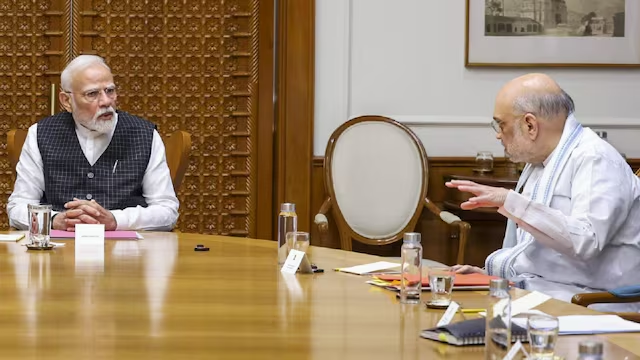Pahalgam And After: Collective Will Is Bedrock Of Collective Response
- By : Dr Anirban Ganguly
- Category : Articles

The imperative for this hour of trial, as called upon by PM Modi, is to firm up our resolve and our will to display our collective national will to stand as one nation.
In the 121st episode of Mann Ki Baat, Prime Minister Narendra Modi expressed the innermost emotions of the entire nation on the Pahalgam terror attack. Only those who made it a crusade, since 2019, to engage in litigation, misinformation and disinformation, to prevent Kashmir from being normal, would disagree with the emotions expressed by PM Modi.
These interest groups with a global footprint, many of whose members have sympathised with and justified the acts of Pakistan-sponsored terrorists and terror groups in the past, made it their mission to discredit the Modi government and its vision of a “Naya Kashmir”. A near-normalcy in Kashmir would only mean the end of their business. It would mean the shutting down of their shops and propaganda parlours. These groups need to be loudly called out, their intellectual co-partners need to be identified and exposed.
From pipe water connection reaching remote villages for the first time since Independence, medical colleges and connectivity, an increasing pace of infrastructural growth, to a steep rise in investment and rise in employment opportunities, Kashmir was striding towards normalcy. The increasing success of young Kashmiris in international sporting events, winning medals from Yogasana championship to kickboxing to skiing championship, was indicative of the détente in the minds of Kashmir’s gen-next that was gradually taking place. The opening of the first cinema halls in three decades in Srinagar was a sure sign that despite gargantuan challenges and resistances from the break-India elements, Kashmir was inching towards a greater normalcy.
True to his pledge and words, PM Modi and his government have seen to the democratic process being put on track. The “Naya Kashmir” vision needed to be based on an authentic and credible democratic foundation. The elections in Kashmir, both the Lok Sabha and the assembly elections later, saw a record turnout of voters, never seen or heard of in Kashmir in the past. The BJP did not come to power, but emerged, for the first time, as the principal opposition party with its Leader of Opposition in the Jammu and Kashmir Assembly. It did not blame EVMs, did not question the process; instead, PM Modi rejoiced at the peoples’ choice. For him, the process, the democratic exercise and participation, was more important and crucial. It was crucial for the realisation of the Viksit Bharat vision. Viksit Bharat did not leave anyone or any region out and behind. It is a vision for the whole of India, for 140 crore Indians.
The democratic process in Kashmir was a watershed moment since, on the other side, lay a failing and failed State. An artificial State held together by a calcifying glue of anti-Indianness, a State, somehow pulled through by scrapping the decaying residues of a rejected two-nation theory, a State where the democratic process has long been buried in a grave that is unmarked and untraceable.
PM Modi rightly described it when he said that enemies of the nation and the patrons of terror could not accept the reality of Kashmir returning to a vibrant normalcy, a normalcy that is full of possibilities and of hope.
The manner in which the terrorists approached the victims and the segregated murder carried out in the name of religion by singling out non-Muslims, is a signature Pakistan deep-state method. The Pakistani establishment did this in the 1950s during pogroms against minorities in East Bengal. The genocidal Pakistan Army applied the same method in 1971, when its soldiers and generals mass-murdered Bengali Hindus in East Pakistan. The fingerprints, footprints and mindset of the Pakistani rogue-State is clearly visible in the method pursued. The terrorists, who were trained in Pakistan’s hell-holes of terror, were well-versed with that method.
The world has responded to the dastardly and cowardly terror attack in Pahalgam. Leaders from across the world have condemned the terror attack, terming it as “unacceptable”. There has been no prevarication, no equivocal approach, no economy in words from these global leaders when it came to condemning the terror attack. The expression of solidarity was undiluted—the message was that the world stands with India.
PM Modi’s decisions and steps over the last few days since the attack, his cutting short the state visit to Saudi Arabia, the suspension of the Indus Waters Treaty, downgrading diplomatic relations with Pakistan, suspending visas for Pakistani nationals, shutting of the Attari integrated check-post, testing of missiles and demonstrating naval and air preparedness, convening an all-party meeting and the Union Home Minister Amit Shah’s directive for states to ensure that Pakistanis leave, are all steps in line with the demands of the situation.
A mature State, with a rising consciousness of its civilisational essence and fabric, will withstand shocks. A civilisational State responds decisively to affronts to its essence and core, such a response will come, as PM Modi has reiterated and has assured the nation.
The imperative for this hour of trial, as called upon by PM Modi, is to firm up our resolve and our will to display our collective national will to stand as one nation. That resolve and collective will shall be the bedrock of our collective response. That undiminished collective will shall keep burning the hearth of our freedom and unity.












